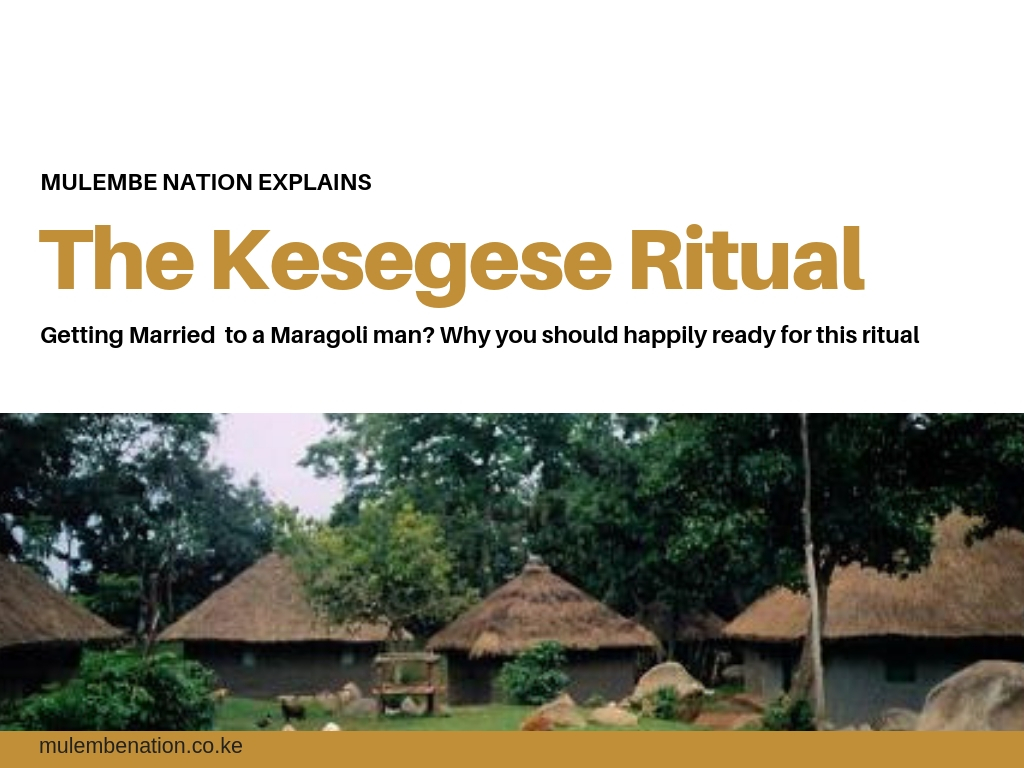Among the rituals that are the body of Maragoli building and construction traditions, the requirement that the wife be present during “kuweka kofia”, kuvika kesegese, reigns supreme.
The kofia (kesegese) is the ‘cap’ that is placed at the apex of the thatched roof of a traditional Maragoli hut. It is the equivalent of the ridge in roofs of modern designs. Traditionally, it was a plate like metal (or thatch) that gave the round roofed thatched home of Mulogoli the appearance of a capped cone.
Similar to the other significant ritual in Maragoli building and construction traditions, where a lass intending to marry is shown where he will construct his house by his fathers, kuvika kesegese was a ritual conducted by the patriarch of the family.
While being shown where to construct by one’s fathers served to ‘license’ the bachelor to conquer land from whence the community will continue to blossom through the fruit of his loins, kuvika kesegese served as an occasion to fully integrate the new family (as they were usually newly weds) into the clan.
Kesegese Ritual in Maragoli Building and Construction traditions Keeps Rats Out, Secures Your Nest
Among the Maragoli, only when a man constructs for his wife, is it considered that the woman fully belongs. Be very worried therefore when your husband mulls over constructing a home for the other woman because once it is done, she no longer is the other woman but a co-wife. Even if your husband can’t stop himself from getting up skirts, aliza majungu (eating rats), your nest is safe.
Worse when he insists to construct a home for you and keeps you away. Ladies, please don’t buy into the trick that your hubby romantically only wants to surprise you with the finished product. For it never will be your house if you miss being physically present during certain rituals. Especially not during kuvika kesegese. Culturally, the clan can bar you from accessing your matrimonial home if you skipped the kesegese ritual.
Once the kesegese ritual took place with the married maiden as a participant, she gained full wife status. This meant that she became deserving of all privileges as a member of her community. Including, but not limited to full burial rites during death.
Moreover, even in the event of her death, and her husband was to remarry, the new wife would have to get her own house and/or kesegese. Alive she is and a rival accesses their matrimonial home – even if the woman had deserted matrimony for selfish gain – the new entrant remains just that: a stranger in her home.
Death Wish
The kesegese ritual of Maragoli building and construction traditions therefore served as the final seal of a marriage. Divorce if it were to arise after kuvika kesegese wouldn’t be a trivial affair. Your estranged husband would have to employ the powers of a special, almost sacred tree, the uluwovu. An act tantamount to a death wish on you by him. It was therefore not a flyby night undertaking.
Your estranged husband’s reasons for calling on uluwovu would have to acceptable to the community as merited. This could include sorcery or murder. But also any other practice that would warrant any individual being ostracized from the community.
Simple acts of infidelity therefore did not qualify.
This is not to say that infidelity went unpunished among the Maragoli. Philanders had to publicly bear shame inducing myths and rituals that carried a death bonus on default of observation upon the death of a spouse. Otherwise, there were rituals which an unfaithful wife had to undergo if she chose to hide her shame, and bury her husband as other ‘good wives’. But that is a story for another day.
Modern day Maragoli land is full of widows and aged women who were beseeched to come back to their matrimonial homes decades after they left for one reason or another. Even if a wife deserts her husband in life, in death she has full rights to ‘guard in his grave’. No fuss. Especially if she achieved ‘full’ wife status (mwenye boma) through such rituals as kuvika kesegese.
Mwenye Boma
Unless she is culpable in his demise, all her ills are forgiven unconditionally. Like the prodigal son, all she has to do is ‘guard’ her husband’s grave. And await for her turn to be buried by the clan she became part of through marriage.
In the event that she passes on whilst estranged, her husband has every right to burying her. Unless of course the separation had been formalized legally or culturally. Even so, if her family assents to it, her villain self will be buried by her husband with the full backing of his clan.
If by some happening that the woman was absent during kuvika kesegese, the house has either to remain without one until she is present; or the kesegese has to be replaced once she reclaims her territory.
So, ladies if you are getting married to the descendants of mulogoli and Khaliyesa, have no shame in demanding for your kesegese. Even in modern life, Maragoli building and construction traditions are of value. For man is to error and modern marriage is not child’s play.

